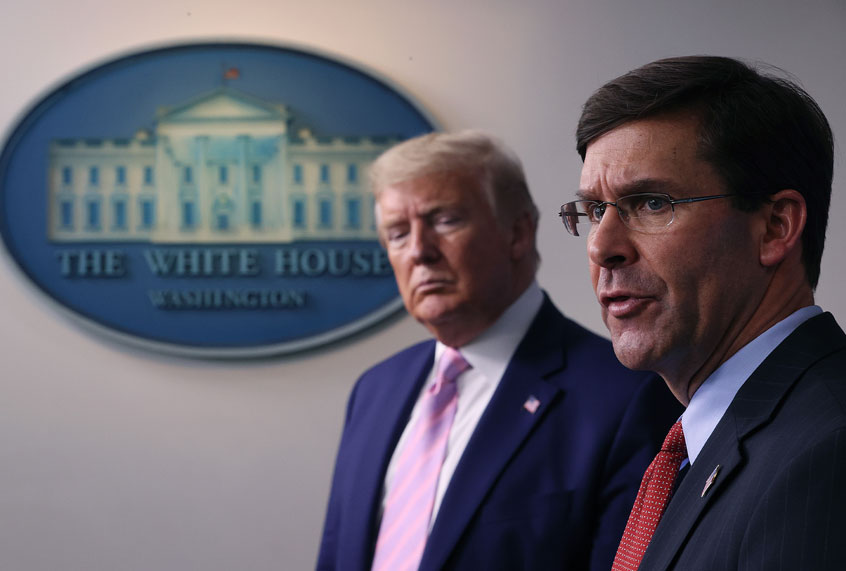Secretary of Defense Mark Esper on Wednesday came out against President Donald Trump’s suggestion to send the military to quell protests around the country against governors’ wishes.
Trump this week lambasted governors as “weak” for not being more aggressive against protesters. The president threatened to invoke the Insurrection Act, an 1807 law aimed at rebellions, to deploy the military into certain states even if governors opposed the idea.
“If a city or a state refuses to take the actions that are necessary to defend the life and property of their residents, then I will deploy the United States military and quickly solve the problem for them,” Trump threatened Monday.
But Esper broke with the president during a news briefing two days later.
“The option to use active-duty forces in a law enforcement role should only be used as a matter of last resort and only in the most urgent and dire situations,” Esper said. “We are not in one of those situations now. I do not support invoking the Insurrection Act.”
Big moment here: Two days after Trump threatened to send active-duty troops to deal with violent protests, Defense Secretary Mark Esper says he opposes the move pic.twitter.com/daKEK7YF8I
— Dave Brown (@dave_brown24) June 3, 2020
Esper also criticized the use of medical evacuation helicopters seen on video being used to try to chase away protesters Monday in Washington.
“When you’re landing that low in the city, it looks unsafe to me,” Esper said, adding that he directed the Army to investigate the incident. The D.C. National Guard launched its own investigation, as well.
Trump’s threats on Monday were underscored by Attorney General William Barr’s order to federal forces to clear Lafayette Park so the president could walk to nearby St. John’s Church for a photo-op. Police backed by the National Guard unleashed tear gas, rubber bullets and flash-bang shells on peaceful protesters to clear the way.
Esper on Tuesday tried to distance himself from the photo-op, initially claiming to NBC News that he thought he was going to accompany Trump to view a vandalized bathroom in Lafeyette Square.
“I thought I was going to do two things: to see some damage and to talk to the troops,” he told the network. “I didn’t know where I was going. I wanted to see how much damage actually happened.”
A Pentagon official told the network that Esper and Gen. Mark Milley, the chairman of the Joint Chiefs of Staff, were caught off-guard by the trip.
“Their understanding is they were going into Lafayette Park to review the efforts of the troops,” the official said.
But Esper admitted at Wednesday’s briefing that he knew exactly where he was going.
“I did know we were going to the church,” he acknowledged, but insisted that “I did not know a photo-op was happening.”
Secretary of Defense Mark Esper said he didn't know what President Trump was going to do when he walked with him to a church near the White House. pic.twitter.com/6eTqgJxDJR
— 13 Action News (@13abc) June 3, 2020
Esper’s comments came after Pentagon policy adviser James Miller resigned Tuesday from the Defense Advisory Board in protest of the secretary’s involvement in the photo-op.
“You recited that same oath on July 23, 2019, when you were sworn in as secretary of defense. On Monday, June 1, 2020, I believe that you violated that oath,” Miller said in a letter addressed to Esper, which warned that a military escalation would “further undermine the Constitution and harm Americans.”
Esper’s attempt to distance himself from Monday’s photo-op and Trump’s military threats “went over poorly with the White House,” multiple sources told CNN after his briefing.
Trump and national security adviser Robert O’Brien were “not happy” with Esper’s remarks. A White House official told the outlet that they did not get advance warning about the comments.
Esper has been on thin ice at the White House over his “tendency to avoid offering a full-throated defense of the president or his policies,” according to the report.
“One person suggested the White House was reluctant to fire Esper given the current crisis and the fact that there are only five months left before the election,” CNN reported. “Another person suggested Trump could leave Esper in place and push blame his way. The president has a history of letting top officials languish in positions long after he’s lost confidence in them.”

